SRJ Hub: Team Bios

Terry McGovern
Senior Associate Dean of Academic and Student Affairs
Terry McGovern, JD, is a human rights lawyer, advocate, and academic who is internationally recognized for her work in health and human rights, sexual and reproductive rights and health, gender justice, and environmental justice. McGovern previously served as the Harriet and Robert H. Heilbrunn Professor and chair of the Heilbrunn Department of Population and Family Health at the Columbia University Mailman School of Public Health. Prior to joining Columbia in 2002, McGovern served as senior program officer in the Gender, Rights, and Equality Unit of the Ford Foundation, where she oversaw global and domestic programming relating to HIV, gender, LGBT, and human rights.
In 1989, McGovern founded the HIV Law Project, where she served as executive director until 1999. While there, she successfully litigated numerous cases against federal, state, and local governments including S.P. v. Sullivan, which forced the Social Security Administration to expand HIV-related disability criteria so that women and low-income individuals can qualify for Medicaid and Social Security benefits; and T.N. v. FDA, which eliminated a 1977 FDA guideline banning women of childbearing potential from early phases of clinical trials.
McGovern’s research focuses on health and human rights, sexual and reproductive rights and health, gender justice and environmental justice, with publications appearing in journals including Lancet Child & Adolescent Health, Health and Human Rights, and the Journal of Adolescent Health.
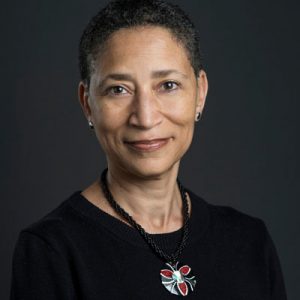
Lynn Roberts
Associate Dean of Student Affairs and Alumni Relations
Assistant Professor of Community Health and Social Sciences
The City University of New York (CUNY) has been Dr. Lynn Roberts’ academic home since 1995. Prior to joining CUNY and the GSPHHP, she oversaw the development, implementation and evaluation of several prevention programs for women and youth in NYC. As an emeritus board member of the SisterSong Women of Color Reproductive Justice Collective, Dr. Roberts has been a national leader in the reproductive justice movement that has been advocating for the sexual and reproductive autonomy of women of color and other marginalized people for over 20 years. She is the co-editor and contributing author of Radical Reproductive Justice: Foundations, Theory, Practice Critique (Feminist Press, 2017). Dr. Roberts’ current activism and scholarship examine the intersections of race, class and gender in adolescent dating relationships, juvenile justice, and reproductive health policies, as well as the impact of models of collaborative inquiry and teaching on civic and political engagement. For decades Dr. Roberts has taught the Community Organizing to Advance Health and Social Justice course in our MPH program, with the highest student evaluation accolades.
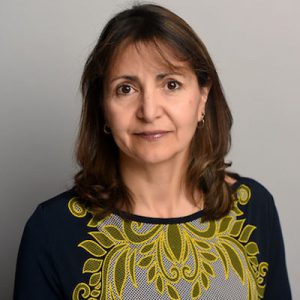
Diana Romero
Professor in the Department of Community Health and Social Sciences
Director of the Maternal, Child, Reproductive and Sexual Health specialization
Dr. Diana Romero has engaged in research and evidence-based advocacy related to reproductive, maternal and child health over the past 20 years. From her early research on factors affecting contraceptive decision-making and continuation among women of different racial/ethnic backgrounds, to the differential impact of the COVID-19 pandemic on pregnant persons in NYS, she has focused on these experiences among marginalized groups by race/ethnicity, socioeconomic and related structural factors. Dr. Romero serves on the NYC DOHMH Advisory Board for the CDC Pregnancy Risk Assessment Monitoring System (PRAMS) survey, and she has served on the FDA Obstetrics and Gynecological Devices Advisory Panel, as well as on the Board of Directors of several non-profit research and advocacy organizations addressing reproduction, gender and health. She teaches graduate courses in research methods, community health, and reproductive and sexual health policy.

Clarisa Bencomo
Project Director for Gender Justice
Clarisa Bencomo works at the intersection of human rights, governance, and philanthropy, with an interest in how global, national, and hyper local systems and practices can be reimagined to promote greater equity. Before joining CUNY SPH, she was the Associate Director for Global Health Justice and Governance at Columbia’s Mailman School of Public Health and previously taught International Development in Columbia’s Graduate School of Architecture, Planning and Preservation. From 2010 through 2018 she developed and led governance programming for the Ford Foundation’s MENA Regional Office in Cairo. Her programming at Ford included support for participatory planning and budgeting to address spatial inequality; research and capacity-building to advance accountability for service provision; documentation and advocacy for policies that are inclusive of migrants and refugees; and regional learning networks and platforms around law and society, post-conflict recovery, and equitable urbanism. In addition to her work in philanthropy, she had a long career as a researcher and advocate on human rights and aid effectiveness, including more than a decade as a researcher at Human Rights Watch based in Cairo and New York.
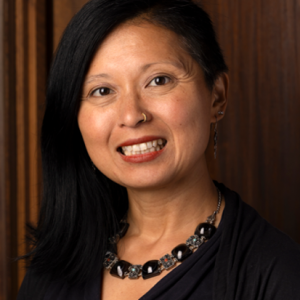
Sabrina Das
Senior Scholar
Sabrina Das, MB ChB, MRCOG, PGDip (BA), supports the SRJ Hub as a Senoir Scholar. Previously a UK Harkness Fellow in Health Care Policy and Practice with the SRJ Hub in 2024-2025, her fellowship project explored innovations and harm reduction strategies used by formal, grass roots, and civil society efforts to support abortion access for minoritized people in New York.
Das maintains a clinical practice as a Consultant Obstetrician and Gynaecologist at Imperial College Healthcare NHS Trust in London, specializing in high-risk pregnancy and complex intrapartum care. She also works for NHS England as a National Maternity Improvement Advisor in the Maternity Safety and Support Programme, the highest level of intervention for maternity units across England. She also works as an abortion surgeon for Marie Stopes International and has worked for Médecins Sans Frontières as a women’s health specialist in conflict zones.
Das is passionate about using quality improvement, coaching, and leadership skills in improving the lives of the largest global group of disenfranchised people (women and girls). Her life mission is to use her clinical and nonclinical expertise to narrow the gap in clinical outcomes and quality of life for women of color, women in poverty, and others who have suffered systemic and historical disadvantage. Das has led projects in Yemen utilizing quality improvement methods to reduce hemorrhage rates, in ethnically diverse West London to coproduce interventions to build trust between formal health care institutions and the local community, and in coastal communities of England to develop equitable pathways of care access. She has published and spoken extensively about quality improvement and how to take policy into practice.
In 2022, Das was listed as one of “50 Leading Lights” by the Kind Leadership Revolution’s Kindness in Leadership Campaign. That year she was also a finalist for the MAMA Academy Healthcare Professional of the Year Award, for providing personalized, culturally competent care to women with breech-presenting babies in pregnancy and labor. In 2021, she was a runner-up for the Health Services Journal Clinical Leader of the Year Award. In her spare time, Das volunteers for her local triathlon club and is an accredited British Triathlon Federation (BTF) Coach. She won the 2019 BTF Award for Children’s Coach of the Year.

Christian Grov
Distinguished Professor
Co-Director, Development Core – Einstein-CUNY-Rockefeller Center for AIDS Research (CFAR)
Dr. Grov’s research centers on the health of sexual and gender minority individuals.
His work has explored substance use, sexual compulsivity, venues where individuals meet sex partners, sex work, HIV/STI prevention, and HIV care. His studies have been supported by both the NIH and CDC. He has co-authored 240+ peer-reviewed articles, as well as several book chapters. He co-wrote “In the Company of Men: Inside the Lives of Male Prostitutes” (Praeger), and co-edited “The Routledge Handbook of Male Sex Work, Culture, and Society.”
Dr. Grov is an Associate Editor of the Journal of Sex Research (2017 – Present) and on the editorial boards of several peer-reviewed journals. He served as Chairperson of the Department of Community Health and Social Sciences (2018-2024) and as a standing member of the NIH’s HIV/AIDS Intra- and Inter-personal Determinants and Behavioral Interventions (HIBI) Study Section (2020 – 2024).
He is former Editor-in-Chief of Sexuality Research and Social Policy, and was a member of the NYC Department of Health’s HIV Prevention Planning Group as well as on the Board of Directors of HOOK, a non-profit dedicated to improving the health and well-being of men who are involved in sex work.
In 2023, Dr. Grov was elected as a Fellow of the Society for the Scientific Study of Sexuality (SSSS) in recognition of his significant contributions to research and scholarship in the science of sexuality.Collectively, Dr. Grov’s body of work seeks to inform HIV and STI prevention, education, and health policy.

Danielle Greene
Executive Director, State and Local Public Health Initiatives
Senior Advisor, NYC Preparedness & Response Institute
Dr. Danielle Greene has dedicated her public health career to enacting change at the intersection of scholarship, practice, and policy. Her expertise lies in building bridges across community, academia, government and healthcare institutions and breaking down silos. The breadth of her research and advocacy is diverse but the underlying commonalities are the social factors that impact marginalized communities, particularly women and children. She has served in senior roles in academia and governmental agencies.
In addition to her work with the SRJ Hub, Dr. Greene currently leads government relations, public health practice, and public health preparedness efforts at CUNY SPH.

Meredith Manze
Associate Professor
Community Health and Health Policy Doctoral Program Director
Meredith Manze, MPH, PhD, is an Associate Professor in the Department of Community Health and Social Sciences at the CUNY Graduate School of Public Health and Health Policy, where she also directs the Community Health and Health Policy Doctoral Program. Rooted in a reproductive justice framework, her applied, equity-driven research seeks to support people across the reproductive continuum- those who do and do not wish to become pregnant, as well as those raising children, with a particular focus on public institutions, including health clinics and colleges.
A mixed-methods researcher, Dr. Manze examines the integration of reproductive health services into primary care, critiques existing measures of pregnancy “intentions,” and is developing alternative metrics centered on reproductive autonomy. She also studies how colleges can better support student parents. Her current work focuses on expanding access to medication abortion on college campuses.

Spring Cooper
Associate Professor and Chair
Department of Community Health and Social Sciences

Heidi Jones
Professor, Dept. of Epidemiology & Biostatistics
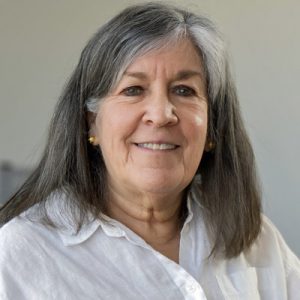
Suzanne McDermott
Professor Department of Environmental, Occupational, and Geospatial Health Sciences
City University of New York Graduate School of Public Health and Health Policy
Suzanne McDermott is a maternal/child health and environmental epidemiologist who studies issues related to preventable and modifiable risk factors during pregnancy that are associated with neurodevelopmental outcomes in children AND the intersection of disability and health. Dr. McDermott and her colleague Dr. Heidi Jones are currently conducting a NIH funded Randomized Intervention Trial to test the efficacy of a curriculum for socialization and sexual education for 16–27-year-olds with intellectual and developmental disabilities. She is also investigating maternal exposure to chemicals during pregnancy associated with epigenetic changes in New York City mothers and newborns. And she is investigating the causal association between maternal exposure to hundreds of chemicals emitted from Toxic Release Inventory sites in New Jersey with the outcomes of autism and intellectual disabilities in the child.
Dr. McDermott has over 150 publications and she has been continuously funded by the CDC, EPA, and NIH since 1991.

Naana Dei
Administrative Executive Assistant
Naana Dei, MPH, is an alumna of the CUNY Graduate School of Public Health and Health Policy. During her time as a student, she explored addressing maternal mortality rates among Black American women and period poverty as a public health issue. As an Alcohol Policy Fellow at the Alcohol Action Network, she is interested in exploring the intersection of alcohol use disorder and pregnant people of color. She is passionate about leveraging her experience as a Black, immigrant woman, to uplift and uphold reproductive rights and justice.
Naana is a former community organizer of the CUNY Urban Food Policy Institute and was the Chair of the Ontario Drug Policy and Research Network in Toronto, Canada. She is currently the Administrative Executive Assistant for the Senior Associate Dean for Student and Academic Affairs and supports the SRJ Hub in various areas including project management and coordination, curriculum support, and event planning.
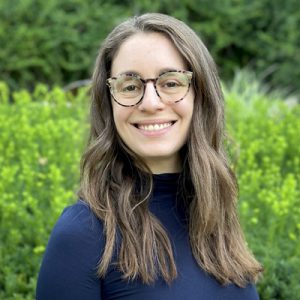
Mollie Braaten
Academic Affairs Manager

Sumana Chandra
Director of Communications and College Relations

Chloe Lecat
Academic Program Specialist
Chloe Lecat is the Academic Program Specialist for the Sexual and Reproductive Justice (SRJ) Hub at the CUNY Graduate School of Public Health and Health Policy. With a background in trauma-informed and equity-focused program management, her work is rooted in social justice and collective liberation. Her professional experience includes supporting Tribal-led initiatives to strengthen child welfare systems and promote Tribal sovereignty, as well as leading evaluation and capacity-building efforts across academic spaces to help communities thrive in ways that are meaningful to them.
At the SRJ Hub, Chloe supports curriculum development, coordinates events, and helps advance programming that centers community voices and lived experience. She is committed to fostering health equity and supporting systems change that uplifts autonomy and leadership in marginalized communities.
